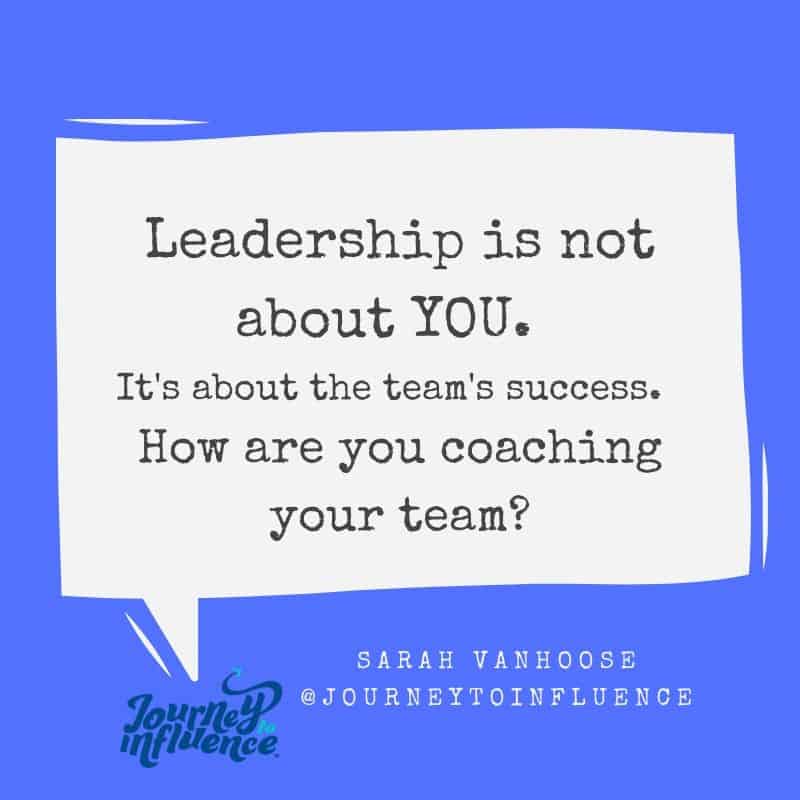When you think of a coach, or coaching what comes to mind? What about leadership coaching. Perhaps, like myself it brings back reminders of high school or college athletics, a team sport with a coach or coaches that knew the game, spouted words of encouragement (most of the time), and stood on the sidelines watching your team win or lose.

My own athletic experience is pretty limited; I played junior varsity basketball a couple of years in high school – and that was only because the school was so small, they needed players. I would have been cut from the team in a hot minute if I was in a larger school. However, I was a natural when it came to track & field. I loved to run (not jump) the 100m hurdles. Went to state and placed three years in a row. In fact, I think I still hold the school record. (Dusts off shoulders with pride…then remembers that she’s now 20 years older and recovering from hernia surgery, ahem – moving on.)
Later on as I was finishing up my junior and senior year of college I went back to my local high school and played an assistant coach role to pass the time, make a few bucks, and attempt to make a difference for a few young whippersnappers.
How does that all of this team coaching talk translate into the work environment? Who is the coach? Who are the players? What is the game?
Let’s hang onto this high school athleticism metaphor a bit longer.
- Athletes – do the work. They train, they practice, they are the ones holding the ball. When not on the ‘field/floor’ they are encouraging their teammates from the sidelines. Star athletes or MVPs are often those looked to for advancement and leadership positions. (In case you need me to spell it out for you here; these are front line staff – the core of your business.)
- Assistant Coaches – likely used to do the work. They manage the performance of the athletes. Do they need drills? Ice? Extra time with their free throws? Carb loading? Benched? (Depending on your organizational hierarchy this may be your Supervisory or Manager level.)
- Head Coaches – if they ever did the work, it was quite some time ago. They are aware of how the game is played and looking to implement strategy to help their team win, not only this game – but the championship. They can’t or shouldn’t work on the floor – it’s not their strength. They are not always natural coaches. Often times they were MVPs in their formal athlete or assistant coach role – and have a hard time transitioning to a head coach role. (This is your company’s manager or director, or maybe business owner.)
Coaching is something that I’m learning a lot more about myself, these days. I am no expert. But I have been taking note of a few things that I’d like to share with you that has helped me be a better leader
What are practices of good leadership coaches?
- You MUST transition from athlete to coach if you’re in a leadership role. You are no longer the player.
- Empower your team to find answers; not simply to go to you for the answer. You are there to support them – not do it for them.
- Celebrate your wins! It’s not a stop at McDonalds for an ice cream cone anymore; or maybe it is!? Rally around your wins!
- Acknowledge your losses. Be open. Be transparent. Decide together how to learn from any mistakes and move forward.
- It’s not all about winning. Making progress toward ‘personal bests’ or team ‘records’ is where it’s at. Keep striving.
- Be a cheerleading coach. Encourage! Recognize! Influence, positively!
- Remove barriers to clear the path for your team.
- Involve the team with decision making whenever possible – should you do a full court press or not?
- Bench your players when needed. They may need rest. They made need a time out…or traded!
- Ask questions to help spark DIY solutions before giving advice.
I tussle with asking thought provoking questions sometimes. Waiting…for someone’s response when you have an idea about how something could be done is hard. Just shelling out advice or for.the.love, just doing it yourself – is WAY easier, but that’s not coaching. The struggle is an important part of the game. True coaching and leadership is helping someone ELSE get to a result of their own choosing. It doesn’t have to be complicated. In its easiest form leadership coaching is simply, being supportive.
Signs of a bad bout of coaching.
- Yelling, of any kind. Nobody wants to play for a dictating manager.
- They think the decisions they make are the best.
- They are caught up in winning, over improvement.
- They’re focused on a few players, instead of the whole team.
I was once an MVP athlete turned bad coach – and I have lessons to share on my journey to overcoming that and becoming a better leader, but we’ll save that for another time.
Questions for Reflection….

1. Are you coaching your team to their potential? Each of them? All of them?
2. What steps can you take to increase your coaching skills? You probably have dozens of coaching conversations daily masked as a quick chat – how can you amp those up?
3. If results were different than expected; ask yourself what should have been done differently – and what was my role in that?
We’re all coaches in some variety, aren’t we? Maybe you’re coaching your kid’s soccer team, or working as fitness instructor, teacher, counselor, financial coach, or even friend. Perhaps you’re leading people in some capacity in your workplace, or managing a couple of kids at home. We all have coaches in us.
How can you up your coaching game this season? I’m definitely leaning in to coaching on my leadership journey and taking advantage of learning from great coaches on my educational journey as well.
Thank you for joining me on my journey to influence.
